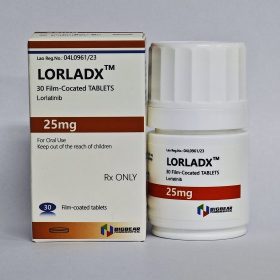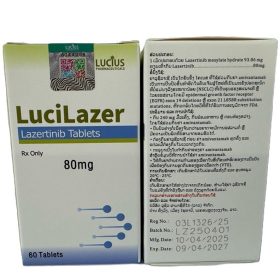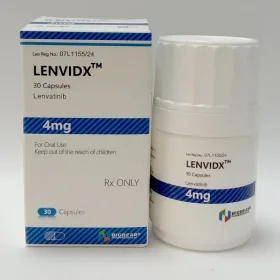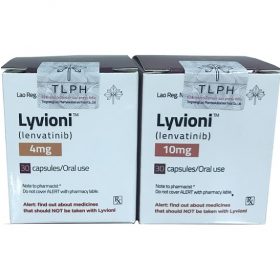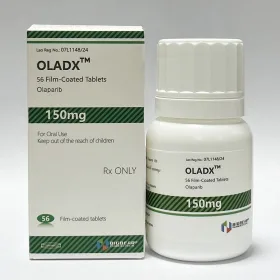- Details
- Description
-
Packaging Size100mg*60tablets/box
-
Strength100mg*60tablets/box
-
CompositonOlaparib
-
Treatmentovarian cancer, fallopian tube cancer, peritoneal cancer, pancreatic cancer, and prostate cancer.
-
FormTablet
-
BrandOlieni 100
-
Quantity Unit60tablets/box
-
ManufacturerTongmeng (Lao) Pharmaceutical & Food Co., Ltd.(TLPH)
Indications
Olaparib is a medication for the maintenance treatment of BRCA-mutated advanced ovarian cancer in adults. It is a PARP inhibitor, inhibiting poly ADP ribose polymerase (PARP), an enzyme involved in DNA repair. It acts against cancers in people with hereditary BRCA1 or BRCA2 mutations, which include some ovarian, breast, and prostate cancers.
-
Medical uses
Olaparib is indicated to treat breast cancer, ovarian cancer, fallopian tube cancer, peritoneal cancer, pancreatic cancer, and prostate cancer.
Why is this medication prescribed?
Olaparib tablets are used to help maintain the response of certain types of ovarian (female reproductive organs where eggs are formed), fallopian tube (tube that transports eggs released by the ovaries to the uterus), and peritoneal (layer of tissue that lines the abdomen) cancer in people who have completely responded or partially responded to their first or later chemotherapy treatments. Olaparib tablets are also used to treat certain types of breast cancer that has spread to other parts of the body and has not improved or has worsened after treatment with other therapies. Olaparib tablets are also used to treat a certain type of prostate cancer that has spread to other parts of the body, no longer responds to medical or surgical treatments to lower testosterone levels, and has progressed after treatment with enzalutamide (Xtandi) or abiraterone (Yonsa, Zytiga). Olaparib tablets and capsules are also used to treat ovarian cancer that has not improved or has worsened after treatment with at least three other therapies. Olaparib tablets are also used to help maintain the response of a certain type of pancreatic cancer that has not spread or progressed after the first chemotherapy treatment. Olaparib is a polyadenosine 5'-diphosphoribose polymerase (PARP) enzyme inhibitor. It works by killing cancer cells.
-
Medicine usage
Olaparib comes as a tablet or a capsule to take by mouth twice daily with or without food. Try to space your doses about 12 hours apart. Take olaparib at around the same times every day. Follow the directions on your prescription label carefully, and ask your doctor or pharmacist to explain any part you do not understand. Take olaparib exactly as directed. Do not take more or less of it or take it more often than prescribed by your doctor.
Swallow the tablet or capsule whole; do not crush chew, divide, or dissolve them.
Olaparib is available as a tablet and as a capsule. The tablets and capsules contain different amounts of olaparib and should not be substituted for one another. Talk to your doctor or pharmacist if you have any questions about the tablet and capsule preparations.
Your doctor may decrease your dose of olaparib or tell you to stop taking olaparib for a period of time during your treatment. This will depend on how well the medication works for you and any side effects you may experience. Be sure to tell your doctor how you are feeling during your treatment with olaparib.
Your doctor or pharmacist will give you the manufacturer's patient information sheet (Medication Guide) when you begin treatment with olaparib. Read the information carefully and ask your doctor or pharmacist if you have any questions. You can also visit the Food and Drug Administration (FDA) website (http://www.fda.gov/Drugs/DrugSafety/ucm085729.htm) to obtain the Medication Guide.
-
Other uses for this medicine
This medication may be prescribed for other uses; ask your doctor or pharmacist for more information.
- side effects
Olaparib may cause side effects. Tell your doctor if any of these symptoms are severe or do not go away:
nausea
vomiting
diarrhea
constipation
heartburn
headache
decreased appetite
muscle, joint, or back pain
fatigue
stomach pain or discomfort
taste changes
mouth pain or sores
anxiety
depression
dry skin
itching
rash
difficulty falling asleep or staying asleep


